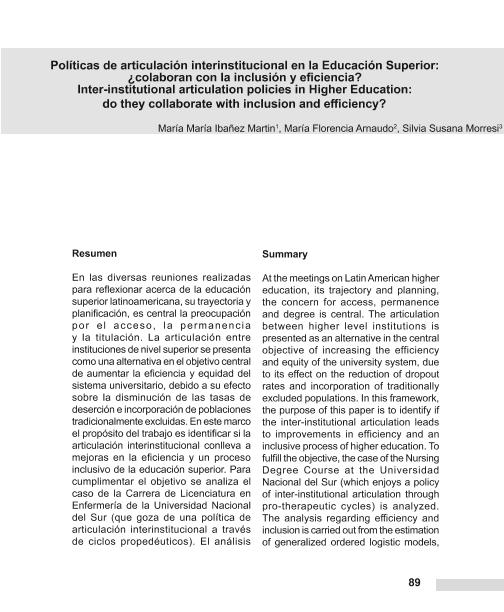Artículo
En las diversas reuniones realizadas para reflexionar acerca de la educación superior latinoamericana, su trayectoria y planificación, es central la preocupación por el acceso, la permanencia y la titulación. La articulación entre instituciones de nivel superior se presenta como una alternativa en el objetivo central de aumentar la eficiencia y equidad del sistema universitario, debido a su efecto sobre la disminución de las tasas de deserción e incorporación de poblaciones tradicionalmente excluidas. En este marco el propósito del trabajo es identificar si la articulación interinstitucional conlleva a mejoras en la eficiencia y un proceso inclusivo de la educación superior. Para cumplimentar el objetivo se analiza el caso de la Carrera de Licenciatura en Enfermería de la Universidad Nacional del Sur (que goza de una política de articulación interinstitucional a través de ciclos propedéuticos). El análisis respecto a eficiencia e inclusión se realiza a partir de la estimación de modelos logísticos ordenados en su versión generalizada, comparando el comportamiento (rendimiento) de los estudiantes de Enfermería y el resto de los estudiantes de la UNS. Los resultados obtenidos permiten sostener que el rendimiento se ve favorecido por las medidas de articulación, mientras que ciertos factores socioeconómicos afectan de manera disímil a los conjuntos de estudiantes objeto de comparación. At the meetings on Latin American higher education, its trajectory and planning, the concern for access, permanence and degree is central. The articulation between higher level institutions is presented as an alternative in the central objective of increasing the efficiency and equity of the university system, due to its effect on the reduction of dropout rates and incorporation of traditionally excluded populations. In this framework, the purpose of this paper is to identify if the inter-institutional articulation leads to improvements in efficiency and an inclusive process of higher education. To fulfill the objective, the case of the Nursing Degree Course at the Universidad Nacional del Sur (which enjoys a policy of inter-institutional articulation through pro-therapeutic cycles) is analyzed. The analysis regarding efficiency and inclusion is carried out from the estimation of generalized ordered logistic models, comparing the behavior (performance) of the Nursing students and the rest of the UNS students. The obtained results allow to sustain that the performance is favored by the interinstitutional articulation, while certain socioeconomic factors has a dissimilar effect on the groups of students’ object of comparison.
Políticas de articulación interinstitucional en la Educación Superior: ¿colaboran con la inclusión y eficiencia?
Título:
Inter-institutional articulation policies in Higher Education: do they collaborate with inclusion and efficiency?
Fecha de publicación:
09/2020
Editorial:
Universidad Nacional de Mar del Plata. Facultad de Humanidades
Revista:
Revista de Educación
ISSN:
1853-1318
e-ISSN:
1853-1326
Idioma:
Español
Tipo de recurso:
Artículo publicado
Clasificación temática:
Resumen
Palabras clave:
INCLUSION
,
EFICIENCIA
,
EDUCACION
,
ARTICULACIÓN INTERINSTITUCIONAL
,
ARGENTINA
Archivos asociados
Licencia
Identificadores
Colecciones
Articulos(IIESS)
Articulos de INST. DE INVESTIGACIONES ECONOMICAS Y SOCIALES DEL SUR
Articulos de INST. DE INVESTIGACIONES ECONOMICAS Y SOCIALES DEL SUR
Citación
Ibañez Martín, María María; Arnaudo, María Florencia; Morresi, Silvia Susana; Políticas de articulación interinstitucional en la Educación Superior: ¿colaboran con la inclusión y eficiencia?; Universidad Nacional de Mar del Plata. Facultad de Humanidades; Revista de Educación; 21; 1; 9-2020; 89-111
Compartir




